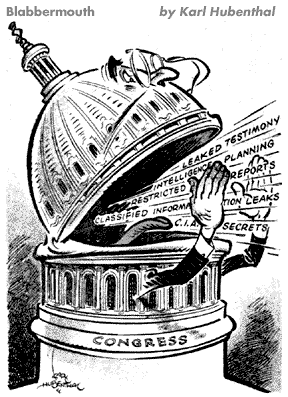
| The
textual contents of this site remain © 2013 by Bob Staake.
The art is © 2013 by Karl and Elsie Hubenthal - All Rights
Reserved. No portion of this web site may be used without the
consent of the copyright owners. |
|
|
 
-
| A
Tribute to One of the All-Time Great Cartoonists and Illustrators |
-
-
-
-
-
-
| Hubenthal's conservative politics were always
apparent in his work, as were his labels, an oft-used editorial
cartooning gimmick. (Collection
of Bob Staake) |
|
 |
-
 |
|
Regardless of the cartoonist's political conservatism,
President
Johnson
was one of Hubenthal's most avid fans, requesting from Hubie
the original art of at least 16 cartoons. |
-

| Staddling
both realism and cartoon exaggeration, Hubenthal's caricatures
were usually "kind" --especially was the case with
Richard
Nixon,
whom Hubenthal defended vigorously, even to the final days of
his Presidency. |
|
-
| Almost invariably, Hubenthal's editorial cartoons
included a "tagline" of sorts (here "Blabbermouth"),
even when not entirely necessary. Hubenthal was particularly
adept at using iconic graphic elements, such as the U.S. Capitol
dome, and then visually tweaking it so that it metamorphoses
into something entirely different, in this case, a blabbering
legislator. |
|
 |
-
 |
|
Documenting the splashdown of Apollo 14, the
space mission in which Alan Shepard chipped golf balls on the lunar surface. Hubenthal's
editorial cartoon was simply a lighthearted "gag" cartoon
on the news of the day. However, such non-commentative frivolity
on the editorial page was uncommon in 1974, even viewed as "lightweight"
-- ironic that as we approach the millennium, the gag approach
to editorial cartooning is almost an industry-wide standard among
syndicated newspapers cartoonists. |
-
|

| Working
on coquille board for the majority of his newspaper career, few
ever used the medium in more expert fashion than Hubenthal. |
|
-
|

| In
the late 1970s, Hubenthal began creating his editorial cartoons
on "Grafix" board, a chemically-trated paper in which
gray tones are mechanically imbedded. Though Hubenthal originally
had misgivings about the "mechanical" nature of Grafix,
he did indeed use it (almost exclusively) until his retirement
in 1982. (Collection
of Elsie Hubenthal) |
|
|

